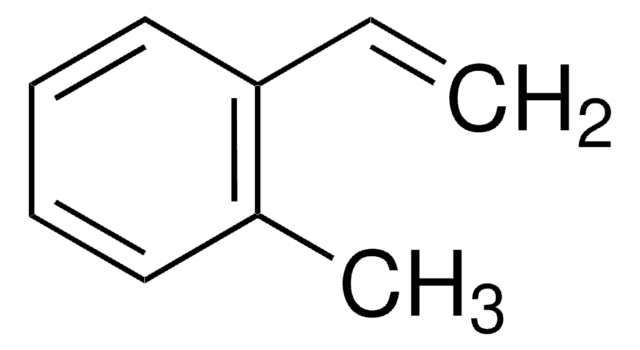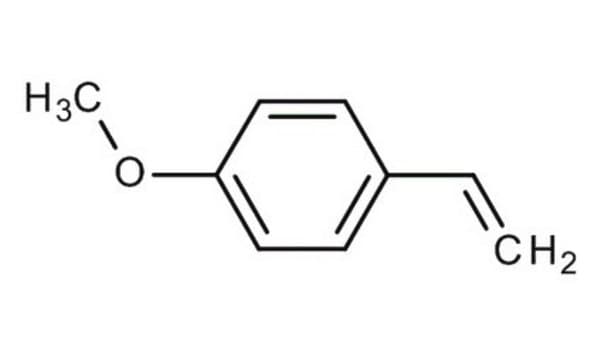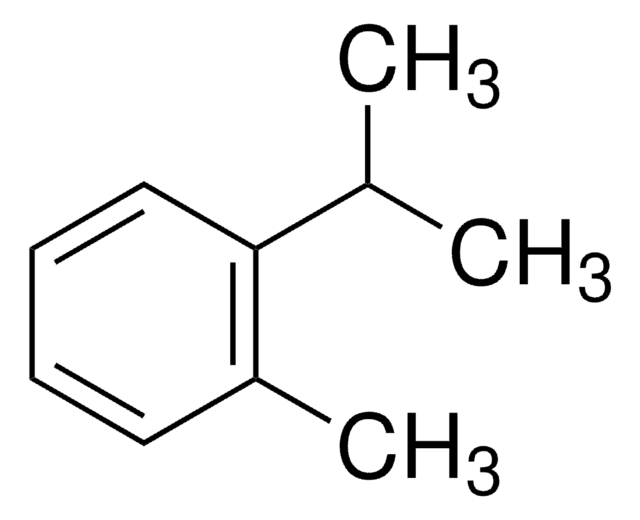522864
Methylstyrene
60% meta, 40% para and 1% ortho, 99%, contains ~50 ppm 4-tert-butylcatechol as inhibitor
Synonym(s):
Vinyltoluene
Sign Into View Organizational & Contract Pricing
All Photos(2)
About This Item
Linear Formula:
CH3C6H4CH=CH2
CAS Number:
Molecular Weight:
118.18
Beilstein:
1209317
EC Number:
MDL number:
UNSPSC Code:
12162002
PubChem Substance ID:
NACRES:
NA.23
Recommended Products
Assay
99%
contains
~50 ppm 4-tert-butylcatechol as inhibitor
refractive index
n20/D 1.5425 (lit.)
bp
168 °C (lit.)
density
0.893 g/mL at 25 °C (lit.)
storage temp.
2-8°C
SMILES string
Cc1ccc(C=C)cc1.Cc2cccc(C=C)c2
InChI
1S/2C9H10/c1-3-9-6-4-8(2)5-7-9;1-3-9-6-4-5-8(2)7-9/h2*3-7H,1H2,2H3
InChI key
VAPKHDZBJXRVNG-UHFFFAOYSA-N
Related Categories
General description
Methylstyrene can be used as a monomer in the synthesis of block copolymers for resins and adhesives. It is widely used as a starting material to prepare latexes for paper coating applications.
Application
- Applications in cancer therapy: Investigation into (−)-Epicatechin incorporated in phytopharmaceuticals for cancer treatment discusses its bioactive properties and synergistic effects when combined with other therapeutic agents, providing new avenues for integrative cancer therapies (Idoudi et al., 2024).
Signal Word
Danger
Hazard Statements
Precautionary Statements
Hazard Classifications
Acute Tox. 4 Inhalation - Asp. Tox. 1 - Eye Irrit. 2 - Flam. Liq. 3 - Skin Irrit. 2 - STOT SE 3
Target Organs
Respiratory system
Storage Class Code
3 - Flammable liquids
WGK
WGK 3
Flash Point(F)
125.6 °F - closed cup
Flash Point(C)
52 °C - closed cup
Choose from one of the most recent versions:
Already Own This Product?
Find documentation for the products that you have recently purchased in the Document Library.
Customers Also Viewed
Karla M Robotti et al.
Journal of separation science, 32(20), 3379-3387 (2009-09-25)
Polyimide HPLC-Chip devices containing poly(methylstyrene-bis-p-vinylphenyl)ethane (MS/BVPE) stationary phase within the device channels and with wall attachment were prepared by thermally initiated free radical polymerization. The microfluidic devices were coupled to both UV and MS detectors. The potential of the MS/BVPE
Alexandre F De Moraes Filho et al.
Sensors (Basel, Switzerland), 18(6) (2018-06-20)
This paper presents a gaseous oxygen detection system based on time-resolved phosphorimetry (time-domain), which is used to investigate O2 optical transducers. The primary sensing elements were formed by incorporating iridium(III) and palladium(II) meso-tetrakis(pentafluorophenyl)porphyrin complexes (IrTFPP-CO-Cl and PdTFPP) in polystyrene (PS)
Daniel A Singleton et al.
Journal of the American Chemical Society, 127(18), 6679-6685 (2005-05-05)
The epoxidation of beta-methylstyrene catalyzed by the Shi fructose-derived ketone is studied using experimental kinetic isotope effects and DFT calculations. The observation of a large beta olefinic (13)C isotope effect and small alpha carbon isotope effect is indicative of an
Sandra C Greer
Annual review of physical chemistry, 53, 173-200 (2002-04-25)
The aggregation of monomers into polymers, whether by covalent or noncovalent interactions, is often reversible and frequently occurs with the entropy and enthalpy of the aggregation sharing the same sign. In such a case, the aggregation goes forward or reverses
Henry Dube et al.
Journal of the American Chemical Society, 132(29), 9984-9985 (2010-07-09)
The trans to cis isomerization of 4,4'-dimethylazobenzene by the nonchemical stimuli light and heat alters its guest binding properties, allowing control over encapsulation of a second guest. We show here how this remote control for reversible encapsulation can be used
Our team of scientists has experience in all areas of research including Life Science, Material Science, Chemical Synthesis, Chromatography, Analytical and many others.
Contact Technical Service
















